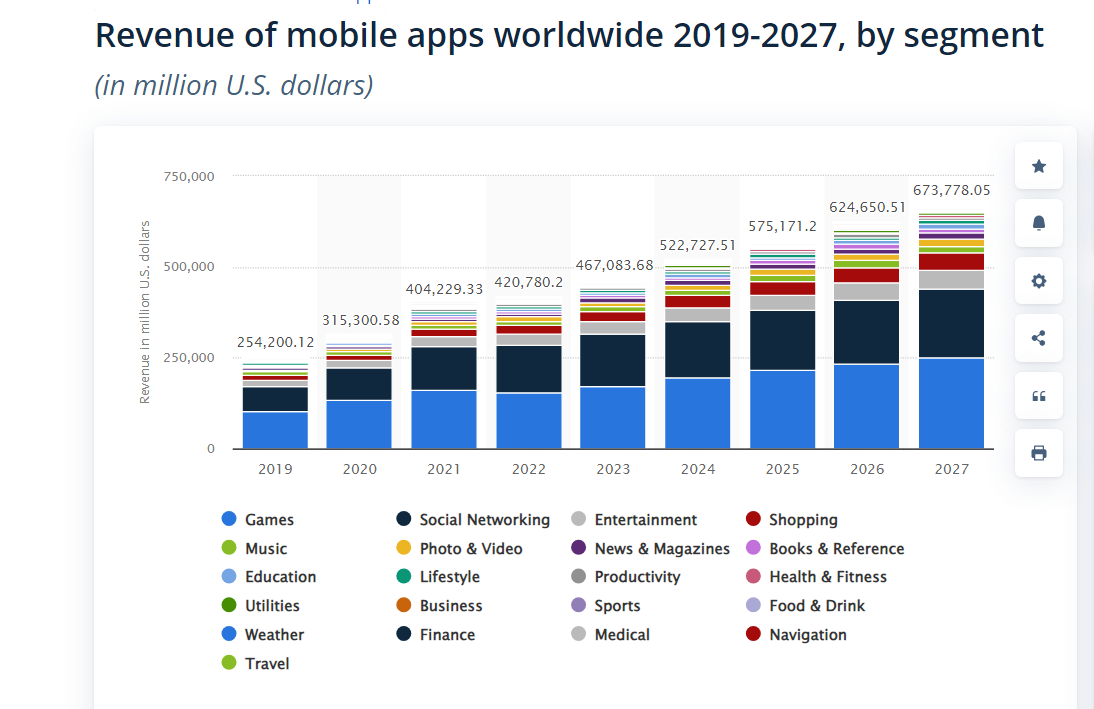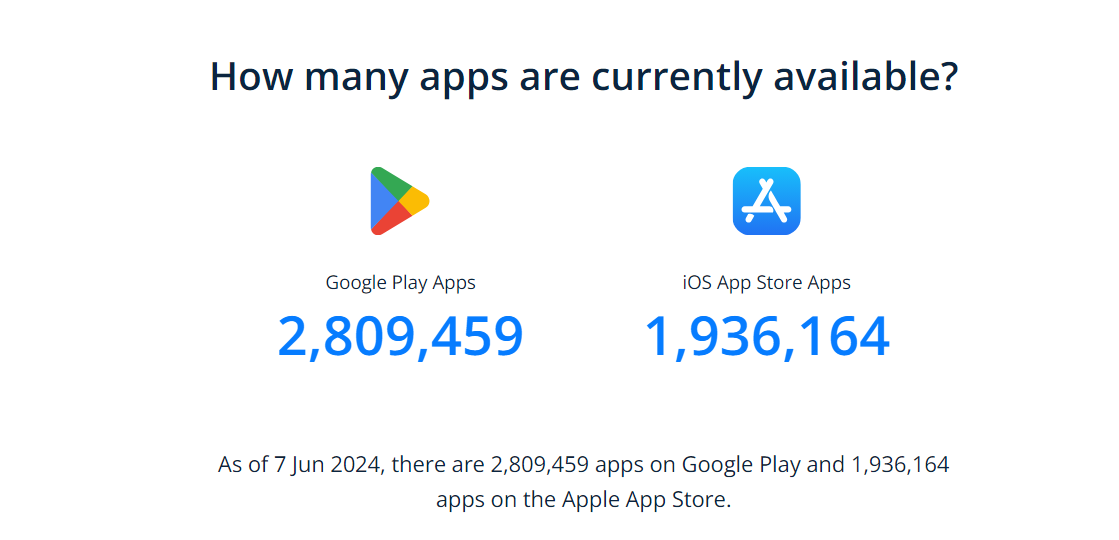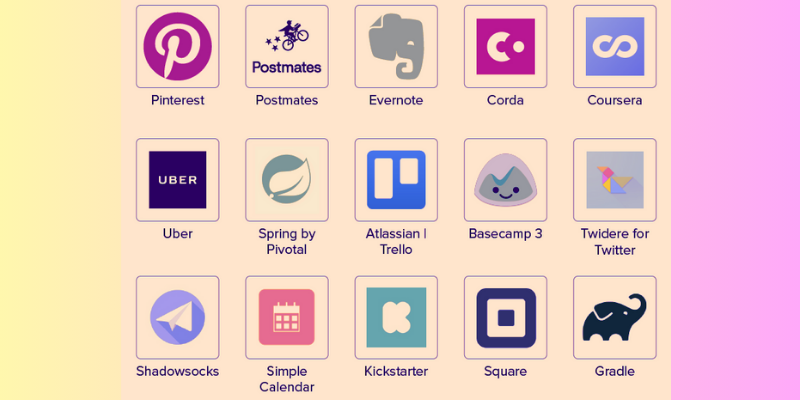The moment you decide to create a mobile application for your business, you’re hit with a tidal wave of questions surrounding you.
- What features to include?
- Which platform to target?
- And, very crucially, what programming language to choose?
Swift, Kotlin, or Python- which programming language to pick for app development? However, figuring out its answer is not a cakewalk.
It depends on different competing factors, including your deadline, objective, target audience, budget, and more.
However, why do you need to think so much? Why can’t you get your app without going through such a dilemma? The answer is the increasing number of mobile apps!
A report by Statista mentions that global app revenue in 2019 was around 365B U.S. dollars, and in 2027, it is predicted to surpass 935B U.S. dollars.

Another report shows that there are 2,809,459 mobile apps listed in the Google Play Store as of June 7, 2024.
On the other hand, the number of apps was 1,932,871 in the Apple App Store as of June 7, 2024.

Today, after going through various sources around the web, I am going to put some light on the top 10 programming languages for mobile app development. Let’s start with the list without further ado.
Table of Contents
Top 10 Programming Languages For Mobile App Development
While there are tons of coding languages (approx 9,000+) in the market, only a few fractions are used frequently today. Reasons for picking any particular language vary from project to project.
One who has to develop a Native App would pick (Kotlin for Android and Swift for iOS). Similarly, if someone is seeking to develop a web application would pick JavaScript, Scala, or else. However, some of the top programming languages for app development include:
1. Swift: Unleashing Potential on iOS
- Used For: iOS app development
- Designed By: Chris Lattner, Doug Gregor, John McCall, Ted Kremenek, Joe Groff, and Apple Inc.
- Released In: June 2014
- Popular Apps Built Using Swift: LinkedIn, Lyft
Swiftwhich is developed by Apple, is a powerful programming language that’s highly reliable for iOS app development. No doubt, since it is backed by one of the world’s most popular brands -Apple, safety-oriented features are never missed. It carries several modern features that make it a top pick for app developers.
Out of the top 100 non-game App Store apps (ordered by revenue) on Sep 5, 2022, 90 apps used Swift in the main binary.
Furthermore, for businesses who are aiming to create high-performing, robust apps for Apple’s ecosystem, Swift is the best to go with. Moving on, Swift’s syntax encourages clear and concise coding for iOS, iPadOS, macOS, tvOS, and watchOS apps.
2. Kotlin: Redefining Android App Development
- Used For: Android app development
- Designed By: JetBrains
- Released In: July 2011
- Popular Apps Built Using Kotlin: Pinterest, Uber
Since its introduction by JetBrains and subsequent endorsement by Google, it is a first-class programming language for Android app development. For now, more than 195,000 mobile apps worldwide use Kotlin as their primary language. It has witnessed a meteoric rise in popularity.

Besides, with its compatibility with Java and the introduction of Kotlin Multiplatform, Kotlin allows for code to be shared across multiple platforms. That means, when you hire Kotlin developers, they can smartly use these amazing features to build cross-platform applications.
In short, Kotlin programming language makes it an enticing option to maximize development efficiency while maintaining a high-quality user experience on Android devices.
3. Python: Reliable Backend Services
- Used For: Web and mobile app development, AI, and Machine Learning
- Designed By: Guido van Rossum
- Released In: 1991
- Popular Apps Built Using Python: Dropbox, Reddit
Python’s simplicity and readability have made it a popular choice among developers for web and mobile app development.
It’s versatile, supports multiple programming paradigms, and is perfect for applications that rely heavily on data computation and processing. Prefer to hire mobile app developers in India who have experience in developing hard-core business applications like CRM applications, ERP applications, etc. all by using Python as a backend tool.
Moreover, being an interpreted high-level programming language, Python holds a 29.06 % market share among the top coding languages in the market. (Source: PYPL Popularity of Programming Language Index)
While not a primary language for mobile app development, Python is often used for back-end services and APIs connected to mobile apps. Also, it has a strong presence in emerging domains like machine learning, making it a great option for mobile apps with an AI focus.
4. JavaScript: Most Utilitarian Programming Language
- Used For: Cross-platform app development
- Designed By: Brendan Eich
- Released In: 1995
- Popular App Built Using JavaScript: Google, YouTube
JavaScript is also one of the best programming languages for app development. It offers the flexibility to develop different types of apps that hold cross-platform support with compatibility on Android, iOS, and Windows.
JavaScript has the power to make mobile apps faster and easier to write. Top brands like Google and Meta use JavaScript for mobile apps. Therefore, businesses can hire mobile app developers in India who have experience working with JavaScript.
5. Dart: Object-Oriented, Client-Optimized Programming Language
- Used For: mobile, web, and desktop app
- Designed By: Google
- Released In: 2011
- Popular App Built Using Dart: Google Ads app
Introduced by Google, Dart powers the Flutter framework. It’s optimized for UI, making it suitable for building natively compiled applications for mobile, web, and desktop from a single codebase. Besides, it is a good choice for network calls and data retrieval, thus, listed among the top programming languages for app development.
6. Java: Powerful General-Purpose Programming Languages
- Used For: Android app development, Web applications
- Designed By: Sun Microsystems (now owned by Oracle Corporation)
- Released In: 1995
- Popular App Built Using Java: Spotify, Twitter
Java is a venerable and versatile programming language known for its portability across platforms. For years, it has been the staple language for Android app development due to its robust libraries and extensive community support. It is one of the most used programming languages worldwide for app and software development.
7. Rust: Safe & Modern Programming Language
- Used For: Mobile Apps, Desktop Apps, and Web apps
- Designed By: Graydon Hoare
- Released In: 2010
- Popular App Built Using Rust: Cloudflare, Amazon
Rust is best known for its memory safety features and concurrency management, making it interesting for mobile app developers to choose it for app development. This programming language is widely used to develop high-performance and secure apps.
8. Objective-C: High-Level Programming Language
- Used For: iOS app development
- Designed By: Tom Love and Brad Cox
- Released In: 1984
- Popular App Built Objective-C: WhatsApp
Before Swift, there was Objective-C, the primary language for developing iOS applications. While Swift’s popularity has soared, Objective-C remains in use, particularly in maintaining apps created before Swift’s arrival. It’s a complex language, but its robustness and mature ecosystem make it a viable choice for certain iOS projects. Thus, this programming language iOS mobile application.
9. C#: Multi-Paradigm Programming Language
- Used For: Windows applications, single-page apps
- Designed By: Anders Hejlsberg
- Released In: 2000
- Popular Apps Built Using C#: KeePass, OpenRA
With its foundation in the .NET framework, C# is a powerful language for building Windows applications and games using the Unity game engine. It’s known for being versatile, type-safe, and object-oriented. Therefore, one of the best programming languages for mobile app development.
10. Ruby: Dynamic Programming Language
- Used For: Both iOS and Android apps
- Designed by: Yukihiro Matz Matsumoto
- Released In: 1995
- Popular App Built Using Ruby: Airbnb
Ruby, primarily known for its web development capabilities through the Ruby on Rails framework, is also a contender in mobile app development. Its syntax is easy to understand and write, which reduces development time and costs. Ruby programming language is utilized for MVPs and startups looking to quickly launch their apps.
Wrap up
Here I come to the end of the list of top programming languages for mobile app development in 2024. Businesses can choose any of these that aligns best with their development objectives to get the best results. Moreover, they can consult with a mobile app development company in India to assist them in choosing the right programming language to build their dream app.
FAQs:
Q: How to choose the right programming language for mobile app development?
The decision hinges on various factors. While choosing the right programming language for mobile app development, you can consider things like-
- Platform (Android or iOS)
- Performance requirements
- Development speed
- Future scalability.
Besides, evaluate each language’s ecosystem, community support, and alignment with your project’s goals.
Q: What are the different frameworks used to develop mobile apps?
Some of the popular frameworks out there to develop mobile apps are-
- React Native
- Ionic
- Flutter
- Xamarin
- NativeScript
- PhoneGap
Read:
Tips to Improve User Retention with Mobile App Onboarding
